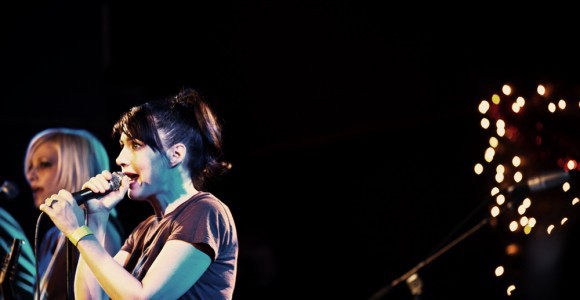Sini Anderson has worked in film for over ten years as a producer, first assistant director, and creative consultant. The Punk Singer is Anderson’s first feature length documentary. She has served as chief curator and artistic director for the National Queer Arts Festival, president of the board of directors for the Harvey Milk Institute, and co-chair of the board of directors for the Queer Cultural Center.
Currently, Anderson is working to finish another feature-length documentary called I Spit On Your Country: Sister Spit, and is developing her first narrative film, based on a 1990 documentary about New York City’s queer culture. Anderson lives both in Brooklyn, NY, and San Francisco, CA. [Press materials]
The Punk Singer will open in New York and Los Angeles on November 29, with a national rollout to follow.
Please give us your description of the film playing.
The first question that the mention of a documentary about Kathleen Hanna prompts is usually, “Why hasn’t one already been made?” Credited as a founder of the third wave of feminism and Riot Grrrl, Hanna has been a seminal radical activist, musician, and cultural icon for over twenty years. She’s also been a lightning rod for controversy, and a famously private person. Five years ago, she disappeared from the public eye, and is only now re-emerging. The Punk Singer combines twenty years of archival footage with an intimate look at four consecutive seasons of Hanna’s present life to tell the story of what happened, and who she is now.
What drew you to this story?
SA: Ever since I was first introduced to Kathleen Hanna’s work, I’ve been totally inspired by her. Her personal story has the potential to be of service to so many people. Anyone making progressive motions towards change within art, feminism or interpersonally is gonna be moved by her story. It’s not hard to be drawn to Kathleen Hanna’s story.
What was the biggest challenge in making the film?
The business of making a film. I’m lucky in that I don’t get very overwhelmed in production, but production is only the beginning. I got my ass kicked by not having the skills or knowledge to make important business decisions. It’s really intense. I’ve been lucky to have great producers, awesome public support, and the support of my subject but even with all of that, it’s felt impossible to keep up at times. It’s not impossible but I’ve learned so much and I have a long list of mistakes that I hope to not repeat in my next project. One can always hope.
What advice do you have for other female directors?
Get the right crew from the very beginning and let them do their jobs. I’m not a lawyer, I’m not a producer and I shouldn’t be trying to be those things. I mean, we don’t give lawyers shot lists and expect them to come back with a beautiful piece of art, right? They wouldn’t have a clue about how to do that. That would just be stupid, so don’t expect to know how to read contacts with legal language, don’t expect to manage money, post-production, or all of your film’s communication. It’s a total set-up for failing. Women often think they need to do it all and I think that is what will stop us from making larger bodies of work. I want to make films that are emotionally moving and beautiful. I don’t want to produce and manage business. It’s not good for anyone, not in my case anyway.
What’s the biggest misconception about you and your work?
That what people read and see on Facebook about my life or work is the whole story. It never is.
Do you have any thoughts on what are the biggest challenges and/or opportunities for the future with the changing distribution mechanisms for films?
I do know that people like to talk about how anyone can make a film now because we have access to the cameras we need, that it doesn’t cost that much money and that we live in a indie culture now where we don’t need the support of larger media outlets or backers. I think this is a really dangerous message to give artists/filmmakers. It’s dangerous because it’s just not true, not if you want to make something good. Not if you want to finish something professionally. We need money, we need professional and trusted colleagues to work with, and those things are hard to come by. The opportunities to share our experiences with each other are more possible now. The opportunity for the public to express their desires for what they want to see and for what they find interesting or smart is so much greater now, and I think that networks and distributors are listening to those desires. That part is really exciting.
Name your favorite women directed film and why.
An Angel at My Table by director Jane Campion. I was 20 when I saw this film and was blown away by how beautiful it was. It addresses class, abuse, and insanity among many other things, and it kicked so much ass. It gave me permission to feel empowered by my own story.
Watch the trailer for The Punk Singer:







